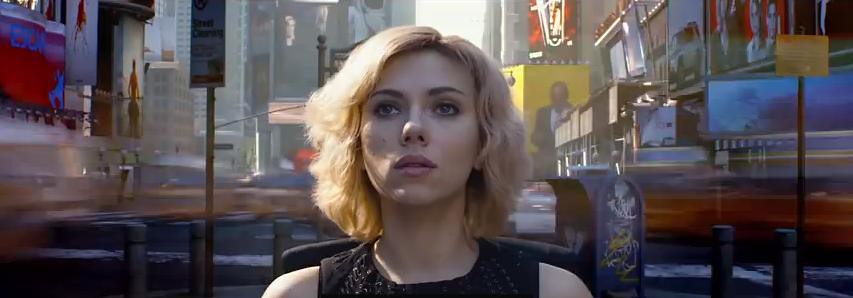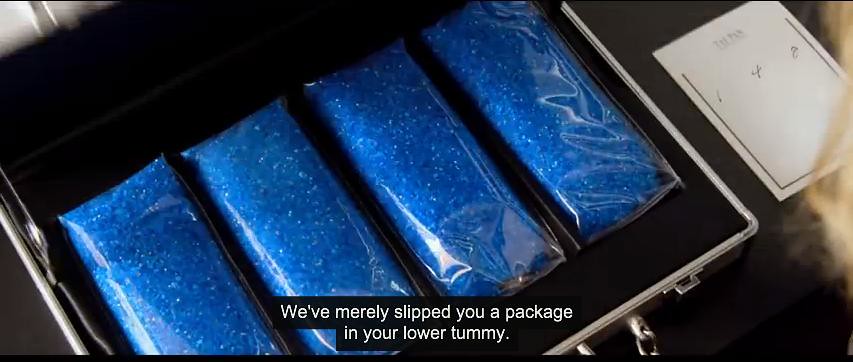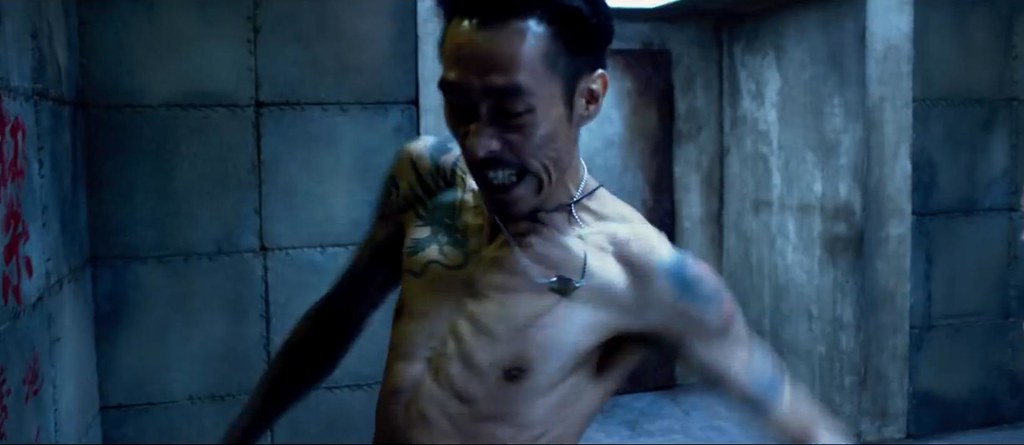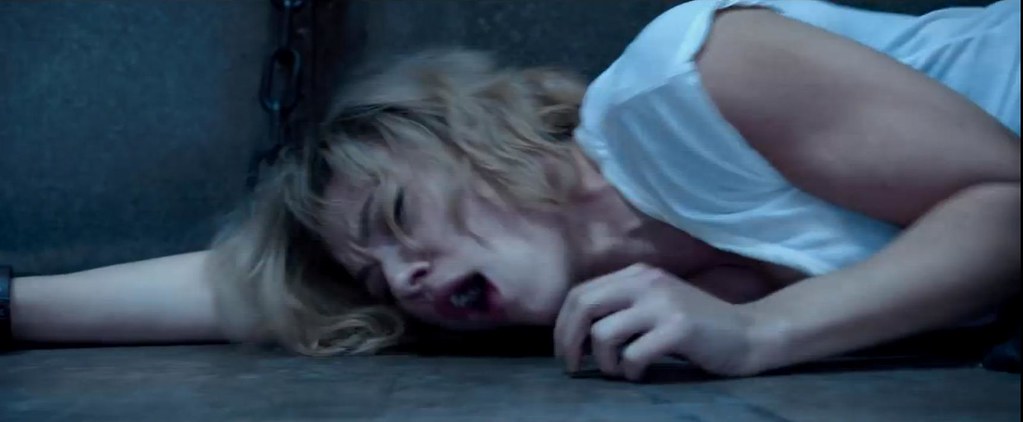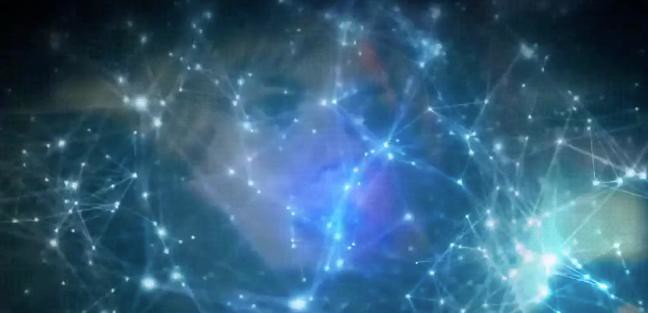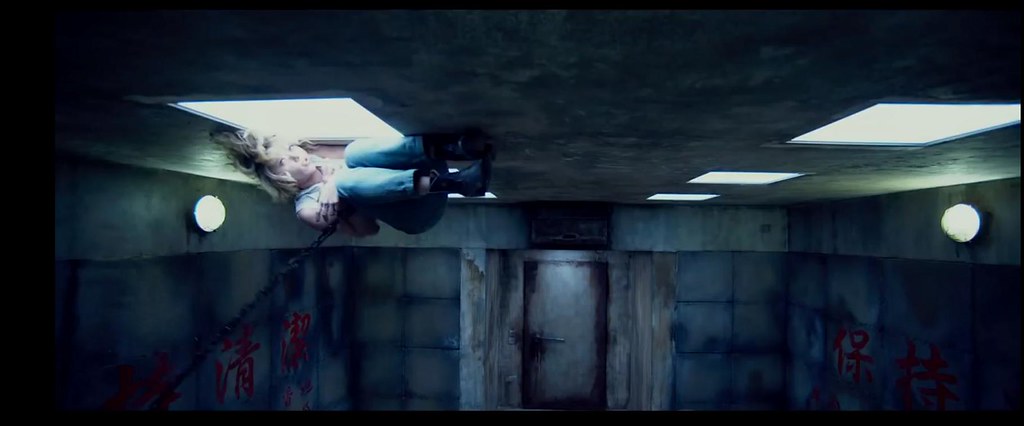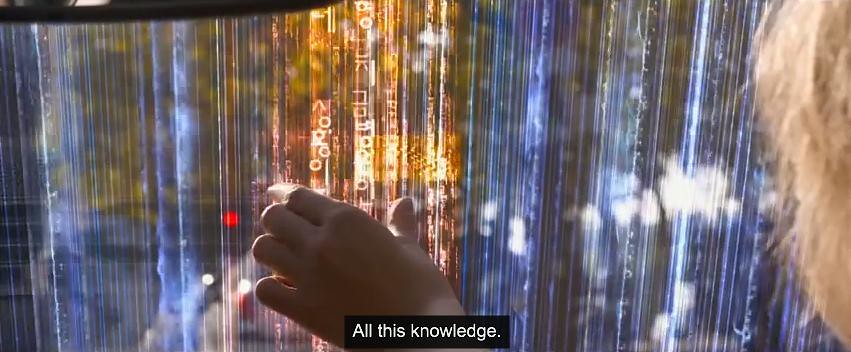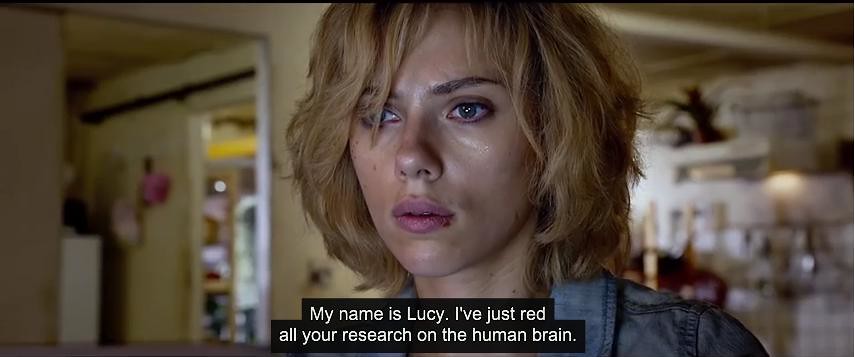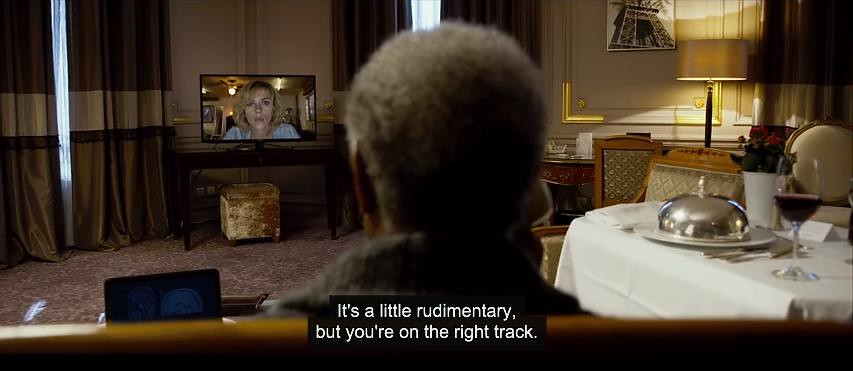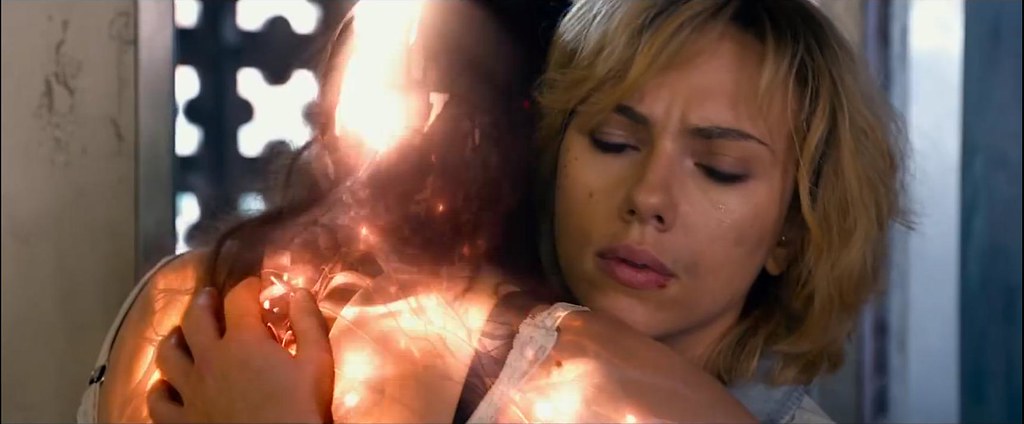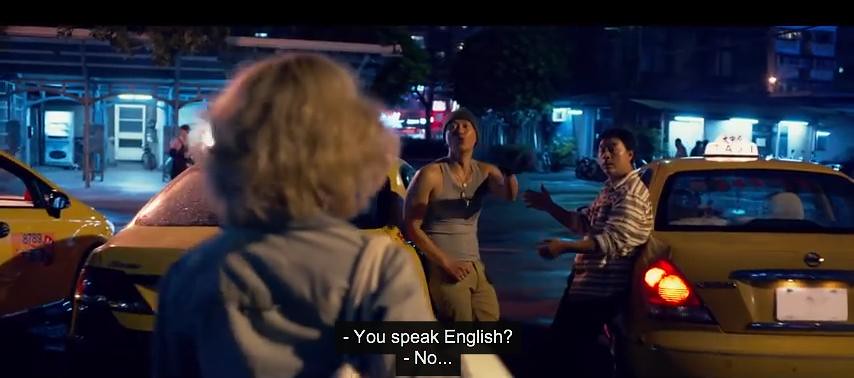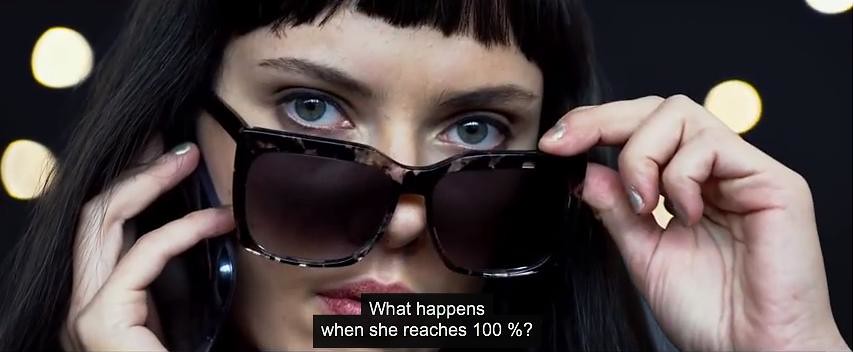Perhaps Lucy's most intriguing theme is that of Feminine stewardship of Knowledge in the face of crisis for a world too-far-gone. Plus, Groot is the new Chewie, and a very early guess on the Oscar-winner for best original song.
Lucy, or I'm every woman, it's all in me.
To my feeble mind, perhaps Lucy's not so much about brain-usage, nor evolution, whatever; it's nothing less than an abrogation of the historically damaging myths of Pandora and Eve. Like always, please ignore all typos.
From this film's opening pop-cult condensation of big-theme, world-too-far-gone montages rather like those found in the stone-cold classic Koyaanisqatsi (which you can watch a sped-up version of in "Random Notes" below), Besson makes eminently manifest that he's not delivering just another action-adventure flick. Ditto his cuts to footage of animal behavior paralleling the film's human action, which reminded me quite a lot of the late and very great Alain Resnais's Mon Oncle D'Amerique.
By way of a quick digressive preview, kudos to the New York Film Festival which will host the North American premiere of the 4K restoration of Resnais's Hiroshima Mon Amour and also to the Montreal World Film festival which will host the North American premiere of his final film, Life of Riley. By way of a two-hour movie-break-within-a-review, you can watch the aforementioned Mon Oncle D'Amerique in its entirety with English subtitles (click "cc" and then click "English On") HERE
Returning to Besson, early in the film we also see "Lucy", AKA Australopithecus afarensis, the being from which we've likely originated, in a shot that makes for a Darwinian trumping of the Adam and Eve myth by simply positing the hominid as the First Lady of Evolution.
Later in the film we see her again, in an episode which simultaneously references Michelangelo's male-centric Sistine chapel, ET, and, through its depiction of an act of female consciousnesses-through-the-ages communing, as Lucy comes face to face with the first woman -- Lucy-the-hominid, not Eve -- reverses 2001: A Space Odyssey's self-important episode wherein Wagner's grandeur celebrates a sentient being going ape-shit when it dawns on him that he can use a bone as a tool to smash the head of, and kill another sentient being to gain superiority through fear. Instead, Besson simply links a being from our present times with the species from which it originated. Both are female.
When I first heard the name of this film, the "Lucy" which instantly came to mind was A Clockwork Orange's naked, four-on-the-floor mannequin from whose bosom flowed synthi-mesc, the chemical hallucinogenic stimulant Alex and his friends would drink to attain hyper-clarity before embarking on sprees of baroque violence.
Besson's titular Lucy also has a chemical stimulant with transformative properties stored within her, and in the beginning of her story she is also very much in the service of men, used as a dispensary (or rather, repository and transporter) through deceit and then physical coercion, beginning with a shady character she's known for a week, who handcuffs her to a silver case, the contents of which are an instant plot-hook mystery (indeed, this films script takes off beautifully, providing a Screenwriting 101 tutorial).
She now has to deliver this case to a Mr. Jan, a brutal syndicate-head, impeccably played by a perfectly-cast Min-sik Choi, who inscrutably maintains the ruthless, world-weary countenance of an always-calculating villain, and, who in one scene washes blood from his hands with an Evian bottle, the red letters of which match the blood, making for an odd (unintentional?) product placement.
The scene in which Lucy opens the suitcase and reveals its mysterious contents (reminding me of Pulp Fiction's radiating suitcase) got big laughs from the audience comprised of a few critics, but mostly of internet ticket-requesters, indicating to me that unless Lucy got fat around the middle (it didn't), it was going to be a winner.
(NOTE: As a reviewer, it is invaluable to see films with civilians, if you want to check your ego and learn something about screenwriting, and presumption about your relevance. Having said this, I'll note that it is also sometimes absolutely essential to see films alone, because sometimes, as Rousseau said, "A crowd is untruth").
By way of another example of the audience-o-meter, when even the security staff at The Purge: Anarchy press screening uttered a guttural "Yeah!" during a kill-the-rich revenge-fantasy scene, I knew that film would do okay. And by way of yet another digression on The Purge: Anarchy, the film seems to suggest to all those pseudo-libertarians who lack a fundamental, three-dimensional understanding about the infrastructure to which we are all a part, what their fallacious suggestions of opting-out (as if) and erroneous micro-management of tax-dollars (which most of them don't pay, be they dirt-poor reactionaries or the very rich who manipulate and fund the reactionaries' "movements") if followed to their logical conclusions, would lead to (anarchy, and not of the Kropotkin variety) and it's something they are not equipped to deal with. On the escalator after the screening I mentioned this subtext to a few fellow film-writers whose names I failed to get; I asked them not to use this idea, and I'm sure they didn't.
By way of some odd extra-credit reading, here's notes on Russian professor Igor Panarin's wrong-headed prognostication in 2008, of well, our nation's collapse into chaos by 2010. Better he should have predicted that The U.S. and Russia -- and just about every other dumb country -- would be locked in a stupid and increasingly dangerous cold war over territories and resources, though of course, this would be presumed as the natural order of things (why, exactly?) and wouldn't have gotten any attenion, nor apparently, any serious diplomatic effort to curtail increasingly (and actually, needlessly) deadly situations from geting worse.
Returning once again to our film in progress (a film which again, I mantain to be about a different, humanity-preserving energy in command of very powerful information), at gunpoint -- and after one of her captors punches her in the face, knocking her out -- Lucy is forced to be a mule, her belly cut open, and a bag filled with a pure form of a new designer drug is placed inside of her.
After another act of brutality, specifically a kick to her newly-stitched stomach, the bag ruptures, its chemical content spilling into her system, fortifying Lucy with hallucinatory clarity far beyond Alex and his droogs, and wisdom beyond any program Neo could download.
And whereas Neo's powers came from mysticism and the aforementioned downloading of programs, we learn, in one of the film's key Feminist signifiers (or perhaps I should say "female power affirmations;" "Feminist" sounds polemic) that the drug Lucy's ingested is derived from CPH4, a very powerful chemical produced by pregnant woman.
I'll note again that I don't consider the whole brain-usage thing to be this film's premise. To my feeble mind, this film is very certainly not all about brain-usage, which is merely a plot-propulsion technique; Lucy seems to be much more significantly about the female -- as very much opposed to the male -- harnessing of knowledge; the adoption of female energy's benign, powerful guardianship of human existence.
And so, like Oscar, through a drug deal gone very bad, she enters the void and gets a glimpse past the vista afforded not by the shuffling off of this mortal coil, but rather an exponential mind-expansion, resultant of the aforementioned increased brain usage, exceeding the approximately 9% to 11% that most of us use. We see Lucy's neurological connections multiplying in a macro-micro visual meditation suggesting cosmic activity.
Lucy's hyper-evolution is intercut with a lecture being given by an august figure, Professor Norman, played by Morgan Freeman (who in real-life is also currently hosting the "Through The Wormhole" series on The Science Channel). By way of an extra-credit science read, various studies indicate that people deeply, viscerally respond to, and trust Freeman's voice. Norman explains to his students that there are more than 100 billion neuro-connections in the human body and he muses on what a human with increased brain usage would be capable of. Here's video of Freeman being applauded on the set of Lucy, for delivering three little words: "I can't imagine."
When Lucy contacts Freeman to tell him his work is on the right track, yet limited, it occurred to me that this film's depiction of a party girl who becomes something more, will be strongly identified with and appreciated by real-world legions of same: Lucy is (amongst other things) the not-really-dumb-party-girl's revenge-fantasy, and I don't mean this with any unkindness whatsoever, quite the opposite.
We get an extremely touching, cinematic Mother's Day card in the subsequent scene during which Lucy calls her mother, and through her now-total recall of her entire life, tearfully thanks Mom for all the kisses, comforts and encouragements -- as she has a surgeon cut her open sans aesthetic (reminding me of Bill Cosby's joke about his wife explaining to him what child-birthing is like: "Take your lower lip and pull it over your head."). In another of this film's many nods to the power of women, this ode to the existentially singular role of motherhood completely hushed the audience; there was a palpable level of appreciation for this film, which was clearly emerging as much more then an action-adventure flick.
If Gravity's semiotics delivered a heroic portrayal of a woman who'd endured deadbeat boyfriends, loss, loneliness, and feared ending up partner-less, Lucy's semiotics remind us that the female half of our human race -- who, on a global scale, if you run the numbers, remain second-class citizens -- are perhaps uniquely suited to save us from ourselves at this point in our evolution.
And if Godard was a champion of women in mostly un-watchable-by-the-masses films, Besson is the feminist semiotic subverter of global Pop-Culture cinema. The only thing that could have made this scene more powerful (albeit perhaps too edgy) would be for Lucy, through her perfect memory, to disprove Freud's rejection of claims of abuse by female patients as "hysteria" (a word with fascinating and depressing etymological roots) recalling her own episodes...perhaps Godard and Besson should collaborate, but I digress. Thankfully, our generation has Lars Von Trier.
Again, all of the aforementioned signifers that seem to inform Lucy beg the question of why there is so much focus on the 100% brain capacity element of the film, when it seems so clear that film is really about the female energy informing the universe and acting in harmony with the cosmos; what seems important isn't the increase in brain usage but rather the increase in power, smartly exercised by a female.
Of course, enlightened (sometimes) cosmic women with epic capabilities are very much Besson's bailiwick. To reference another recent film, if Transcendence was a cautionary tale about a man's attempts to be God-like, Lucy looks at feminine wielding of total power in the service of a pantheistic awareness. Or, as Lucy puts it, in a single-sentence reversal of the Pandora myth: "It's ignorance, not knowledge that creates chaos".
Lest we idealize the feminine, I'll note that man and woman are equally capable of the exact same levels of evil: put another way, the nurturing or mothering instinct is as dangerous and capable of great harm as the conquering instinct which we ascribe to male energy, insofar as both are primal acts of self-preservation which know no limits. And when localized and misdirected toward xenophobia, nationalism or economic survival (the former two usually obfuscations of the ever-present reality of the latter) the results are human tragedies of ignorance.
Continuing with the subject of ignorance, it's disappointing that Lucy got an "R" rating. Those expecting sex scenes will be disappointed; there is only one kiss, and it's brief, yet tender, and a terrific power dynamic role-reversal: the policeman (Amr Waked) Lucy has recruited to help her asks her before she goes to take on the bad guys and save future generation, why, given her super-human abilities, she still needs him to come along, and she kisses him tenderly and tells him: "To remember", meaning of course, to not lose sight of an essential humanity exclusively found in the need for, and regard of, another's affection.
This scene reminded me of a line from Gordon Parks' stone-cold classic film Shaft (exactly why was an extremely moronic re-make made?), when the fearless gumshoe visits his, well, #1 Lady's pad and in a moment of vulnerability, tells her "I got to feeling like a machine, and that ain't no way for a man to feel." Interestingly, perhaps Lucy might have actually been able to include a terrific lovemaking scene, perhaps something along the lines of its cosmic themes?
In a foreshadowing of what Lucy will choose to do with her new awesome power, we cut again to Professor Norman, explaining that humans will exercise one of two instinctive options, depending on an ecosystem's hospitability: immortality, when faced with extinction, or reproduction when faced with a livable climate. Intercut with his mentioning the former, we see contemporary footage of earth-ravage, floods and disasters, brought about climate change, and as he mentions the latter we see pastoral scenes of nature undisturbed, an uninhabited Earth, the juxtaposition suggesting -- and supported by the film's conclusion -- that as we face the brink of a self-created extinction, Lucy won't be reproducing.
And so, after a bad-trippy flight, a car chase, and Lucy's Matrix-esque tele-quelling of her enemies, she makes it to the professor's lab to for a comsic data-transfer. Just as the villain catches up with her and fires his weapon, she approaches 100% brain-usage, and is either already gone or has pulled an Obi-Wan Kenobi, allowing herself to be martyred, her clothes crumpled on the floor, like Obi's musty desert-moon space-monk vestments.
Thusly, Lucy the film and the character simultaneously culminate with her re-materializing, morphing into a kind of dark-fiber tree of knowledge from which she produces the fruit of her presumably near-infinite wisdom via, well, a USB drive -- a digital flower which, in its symbolic, dual-design as phallus and vaginae, seems to merge male and female energies.
When asked where she's gone, she makes (via text-message) like that credit-card Morgan Freeman gets paid beaucoup dolares to narrate commercials for: "I'm everywhere", thusly living up to the etymological origin of Pandora ("giver of everything" -- perhaps "Pandora" would have made a better title for this film) and also restoring Pandora's good name . Those who would bother to note this ending as silly (or even sillier, still, would actually engage in contemplating how unrealistic it is) have perhaps no sense of visual poetry, artistic license nor science-fiction.
Suffice to say, this is one of the year's best films, and I'm guessing its end-theme, "God's Whisper" by Raury, will win the Oscar for best original song.
"God's Whisper" has all the elements: it's beautiful, has a big theme, a hooky chorus, it matches the sentiments of the film and it's used perfectly during the end-credits, in a kind of affirmation of Lucy's themes, unlike the ham-fisted overload of the obligatory, reductive, literalist music-video action-sequences found in most films. Plus, you can just see the "it's a small world" chorus of kids singing at the Oscars, in the kind of number Oscar producers love to stage.
Here's the video -- interestingly, the director, Andrew Donoho has completed his own film about community, choices and a transformative drug, though it is a much grittier earthbound, coming-of-age story (which I have not seen).
Reviews in brief
Guardians of The Galaxy, or, Groot is the new Chewey
On a mind-trip like Max confronting his ID after a meltdown and being placed on time-out by Mom, this perfect Hollywood film's young hero, Peter (Wyatt Oleff), conjures up a fantasy-world-as-coping-mechanism, albeit for much sadder reasons: fleeing the deathbed of his Cancer-stricken Mother (Laura Haddock), whose hand he fails to take during her final moments, and facing his own life in the identity-less void of the absent father.
Children and cinema however, possess unique coping mechanisms and fantastic imaginary escape routes, and almost immediately after our boy pushes open the hospital doors, he faces far greater challenges than earthly mortal grief, when an awesome spaceship locks him in a tractor-beam and he is transported to, well, a galaxy far, far away.
Cue the music, hit "play" on his trusty Sony Walkman loaded with one of Mom's mixtapes of her favorite songs, and he finds himself now fully grown, a buffed-out renegade, self-dubbed "Star-Lord" (Chris Pratt), fleeing bounty hunters whilst scavenging the galaxy for a silver orb which contains time-stones -- essential matter from the earliest, infinitesimal moments twixt the moments, just pre-Big Bang.
Dancing with the stars, alone on a godforsaken planet, he busts ordinary-jockboy semi-spazzy moves to Redbone's "Come And Get Your Love" (I hope the publishing money goes to the right persons) and we see a (justified) bit of studio pride-in-ownership branding, as the title of the film appears. Thus begins a classic film that, if perhaps seen through the eyes of a kid circa now, might be on par -- again, to a new batchakids, so please no generational chauvinism -- with Star Wars or even The Wizard of Oz.
Of course, Star-Lord isn't the only person seeking the silver orb housing the time-stone, (which, with its unique powers endowed by its having existed before a cataclysmic event, is itself a great metaphor on loss and regret).
À la It's a Mad, Mad, Mad, Mad World, he is in competition with others for this cosmic prize, and he battles his adversaries (and allies-to-be) during a terrific, Jackie-Chan-esque slapstick action-sequence taking place in the middle of a city populated by shiny, happy people (not unlike the space station of Elysium).
As the orb slips just out of reach of one and into the hands of another, each tripping the other up with karate moves and stun-guns, we meet Star-Lord's adversaries (and interesting metaphorical sub-components of his anguish), with whom he who will eventually bond, forming a motley crew of walking wounded whose fates have also been hijacked, and who like the words "teenage mutant ninja turtles" sound odd, yet become eminently loveable: the duo of Rocket (Bradley Cooper) a cynical, laboratory-victim-slash-bounty-hunting raccoon with a Napoleonic complex, and Groot (Vin Diesel), a tree-like being which speaks only three words (which you know by now) who like Star Wars' legendary sidekick-to-a-mercenary, Chewbacca, is a generally good-natured behemoth possessing strength you don't wanna mess with, specifically the ability to re-generate and command other plant-life (making for a great eco-revenge warrior on par with the protective trees in the Lord Of The Rings films); Brax (Dave Bautista), an illustrated man of sorts, imprisoned from within and without, by his need for revenge for the loss of his family, and Gamora (Zoe Saldana), a highly-principled space princess turned into a killing machine by her evil stepfather Thanos.
They embark on an adventure which makes for a rich, funny, and truly magical kids' first semi-adult and last still-a-kid-before-Life-gets-permanently-serious movie, and rather than tell you the specifics, I will simply say take your kids, and/or favorite niece or nephew, grandkid, whatever, or just go alone, and go see this (and you will NOT hear these words often in this blog) good-reason-why-Hollywood-exists film.
Simply put, this is the other best movie I've seen this year, along with the great Lars von Trier's Nymphomaniac (about which I'll be posting notes sooner or later).
Returning to an earlier point, while there is only one Star Wars, or The Wizard of Oz, I wonder what it would be like to be a little kid and have this be one of my first big-movie experiences (3-D optional). I simply don't know how this flick doesn't make a billion dollars worldwide.
Forget about Lucy VS Hercules, or whether Guardian of The Galaxy's comic-book fanbase will support it: this is a family movie like The LEGO Movie (except it's even better) and it's going to far exceed Thor: The Dark World and Captain America: The Winter Soldier. I'm guessing that this is going to make The Avengers and Iron Man-type money, and I'm not being a hater when I say I kinda wish there wouldn't be a sequel (there will be), I just don't know how the studio tops this and I'd hate to see this cinema adventure cheapened, corrupted.
RANDOM NOTES
Phonetically, "Lucy" also evokes a street term: its homonym "loosey", which means a loose cigarette, commonly sold outside of corner stores by bottom-feeders of the street economy. My hometown still knows tragedy.
Continuing on the subject of Oscar-nommed songs, I recently told Keira Knightley during an interview (which I will post soon) that she will be nominated for an Oscar for her vocal performance in Begin Again, and Mark Ruffalo joined me in betting everyone in the room five bucks that it would happen. Apparently, I was the first to suggest this, we'll see if I'm right. I also suggested to Knightley (several years ago) that she pen an essay for HuffPost and it's nice to see that she's done so; her notes from the Bor camp in South Sudan can be read HERE.
Cool guest-essays that would be fun to read in HuffPost: Jessica Alba on everyday toxins, and going oranic; Eve Green's entomology and taxidermy show-and-tell.
File under short attention-span theater: herewith, somebody's brilliant idea to condense the very powerful classic film Kotaanisqatsi from ninety minutes to, well, five minutes. Although, one still should check out the full film at normal speed, this could engender some much-needed instant perspective on a difficult day.
Sci-Fi in the summertime: The Film Society of Lincoln Center have programmed a dynamite Sci-Fi series screening August 22 -- August 28, including Morel's Invention, the nearly -- and necessarily -- silent adaptation of Adolfo Bioy Casares' book, which if you (in this case, hopefully) haven't read, means that the film will have you guessing right until the end what it's all about. Those not in NYC can watch the film for free and in its entirety HERE
By way of another Fall preview, CMJ -- College Media Journal's annual Music Marathon, the NYC-based gathering of bands and the college radio DJs that love to play them is accepting music submissions, if you wanna bring your band to town. I think CMJ would do well to restore its film-festival component.
Continuing on with movies and music, there are five days left in annual Sound + Vision series at the Film Soceity of Lincoln Center.

